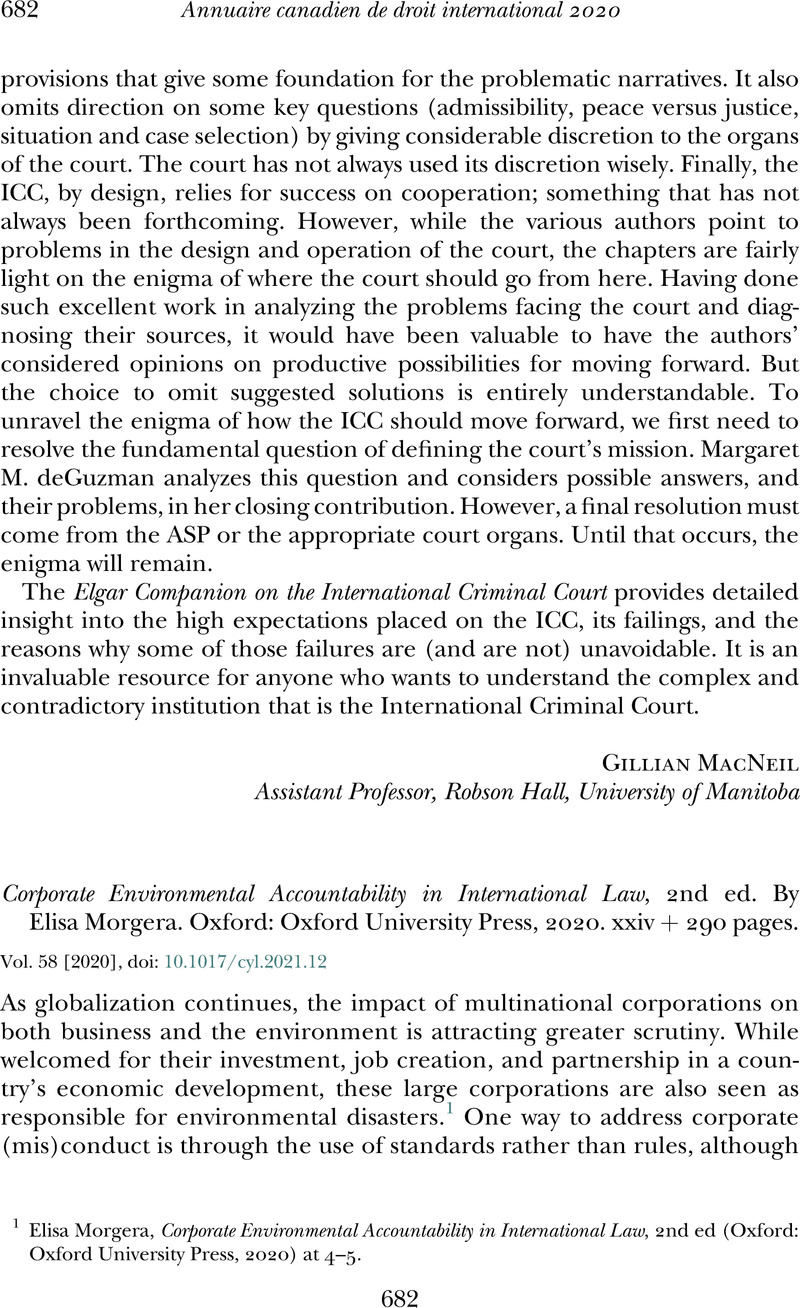No CrossRef data available.
Article contents
Corporate Environmental Accountability in International Law, 2nd ed. By Elisa Morgera. Oxford: Oxford University Press, 2020. xxiv + 290 pages.
Published online by Cambridge University Press: 28 June 2021
Abstract

- Type
- Book Reviews/Recensions de livres
- Information
- Canadian Yearbook of International Law/Annuaire canadien de droit international , Volume 58 , November 2021 , pp. 682 - 690
- Copyright
- © The Canadian Yearbook of International Law/Annuaire canadien de droit international 2021
References
1 Elisa, Morgera, Corporate Environmental Accountability in International Law, 2nd ed (Oxford: Oxford University Press, 2020) at 4–5 CrossRefGoogle Scholar.
2 Ibid at 1–23.
3 Ibid at 3.
4 See Guiding Principles on Business and Human Rights: Implementing the United Nations ‘Protect, Respect and Remedy’ Framework, annexed to the Report of the Special Representative of the Secretary-General on the Issue of Human Rights and Transnational Corporations and Other Business Enterprises, John Ruggie, UN Doc A/HRC/17/31 (2011), endorsed by the UN Human Rights Council (HRC) in 2011. HRC Resolution 17/4, UN Doc A/HRC/RES/17/4 (2011) at para 1.
5 Morgera, supra note 1 at 24, citing Vaughan Lowe, “Corporations as International Actors and Law Makers” (2004) 13 Italian YB Intl L 23 at 32.
6 28 USC § 1350 (1789).
7 Kiobel v Royal Dutch Petroleum Co, 569 US 108 (2013).
8 Rome Statute of the International Criminal Court, 17 July 1998, 2187 UNTS 3, 2002 Can TS No 13, art 8(2)(b)(iv) (entered into force 1 July 2002).
9 Morgera, supra note 1 at 59.
10 Ibid at 78.
11 Ibid at 287.
12 Ibid at 149–50.
13 An open-ended intergovernmental working group (OEIGWG) was tasked by the UN HRC in mid-2014 with the elaboration of an international legally binding instrument to regulate the activities of transnational corporations. See HRC Resolution 26/9, UN Doc A/HRC/RES/26/9 (2014), online: <www.ohchr.org/en/hrbodies/hrc/wgtranscorp/pages/igwgontnc.aspx>.
14 UN Global Compact, online: <www.unglobalcompact.org/>.
15 Citing Interim Report of the Special Representative of the Secretary-General on the Issue of Human Rights and Transnational Corporations and other Business Enterprises, UN Doc E/CN.4/2006/97 (2006) at para 40.
16 Morgera, supra note 1 at 113.
17 Organisation for Economic Co-operation and Development (OECD), Guidelines for Multinational Enterprises (Paris: OECD, 2011), online: <www.oecd.org/daf/inv/mne/48004323.pdf>; International Finance Corporation, Performance Standards on Environmental and Social Sustainability (1 January 2012), online: <www.ifc.org/wps/wcm/connect/topics_ext_content/ifc_external_corporate_site/sustainability-at-ifc/policies-standards/performance-standards/performance-standards>.
18 Morgera, supra note 1 at 179.
19 5 June 1992, 1760 UNTS 79, Can TS 1993 No 24 (entered into force 29 December 1993).
20 Morgera, supra note 1 at 146.
21 Ibid at 154. Akwé: Kon Voluntary Guidelines for the Conduct of Cultural, Environmental and Social Impact Assessment regarding Developments Proposed to Take Place on, or Which Are Likely to Impact on, Sacred Sites and on Lands and Waters Traditionally Occupied or Used by Indigenous and Local Communities, UN Doc UNEP/CBD/COP/DEC/VII/16 (13 April 2004), online: <www.cbd.int/traditional/guidelines.shtml> (named with a Mohawk term meaning “everything in creation”).
22 Morgera, supra note 1 at 211.
23 Addis Ababa Principles and Guidelines for the Sustainable Use of Biodiversity, UN Doc UNEP/CBD/COP/DEC/VII/12 (13 April 2004), online: <www.cbd.int/sustainable/addis.shtml>.
24 Morgera, supra note 1 at 163.
25 Report of the Special Rapporteur on the Implications for Human Rights of the Environmentally Sound Management and Disposal of Hazardous Substances and Wastes, Baskut Tuncak, UN Doc A/HRC/30/40 (2015) at para 101(b), (c), cited in Morgera, supra note 1 at 171.
26 UN Doc UNEP/CBD/COP/DEC/X/1, 29 October 2010 (entered into force 12 October 2014).
27 General Assembly Resolution 61/295, UN Doc A/RES/61/295 (2007).
28 Morgera, supra note 1 at 185–86.
29 Ibid at 288.
30 Meaning “roots of life” in the Maya language, the Mo’otz Kuxtal Voluntary Guidelines on consent and benefit-sharing from the use of traditional knowledge of Indigenous peoples and local communities were adopted in 2016. Mo’otz Kuxtal Voluntary Guidelines, UN Doc CBD/COP/DEC/XIII/18 (17 December 2016), online: <www.cbd.int/doc/publications/8j-cbd-mootz-kuxtal-en.pdf>.
31 Morgera, supra note 1 at 186, 188. See also James S Anaya, Indigenous Peoples in International Law, 2nd ed (New York: Oxford University Press, 2004).
32 Morgera, supra note 1 at 208. See also Report of the Special Rapporteur on the Situation of Human Rights and Fundamental Freedoms of Indigenous Peoples, James Anaya, UN Doc A/HRC/15/37 (2010) at paras 67, 71–80.
33 Morgera, supra note 1 at 228.
34 Ibid at 232, citing Gefion Schuler, “Effective Governance through Decentralized Soft Implementation: The OECD Guidelines for Multinational Enterprises” (2008) 9 German LJ 1753 at 1773.
35 Morgera, supra note 1 at 136.
36 Ibid at 257.
37 Ibid at 272–73.
38 Ibid at 273, 279. One special rapporteur addressed his recommendations to the government, while another called for both companies and the government to address an identified situation of corruption and environmental harm.




